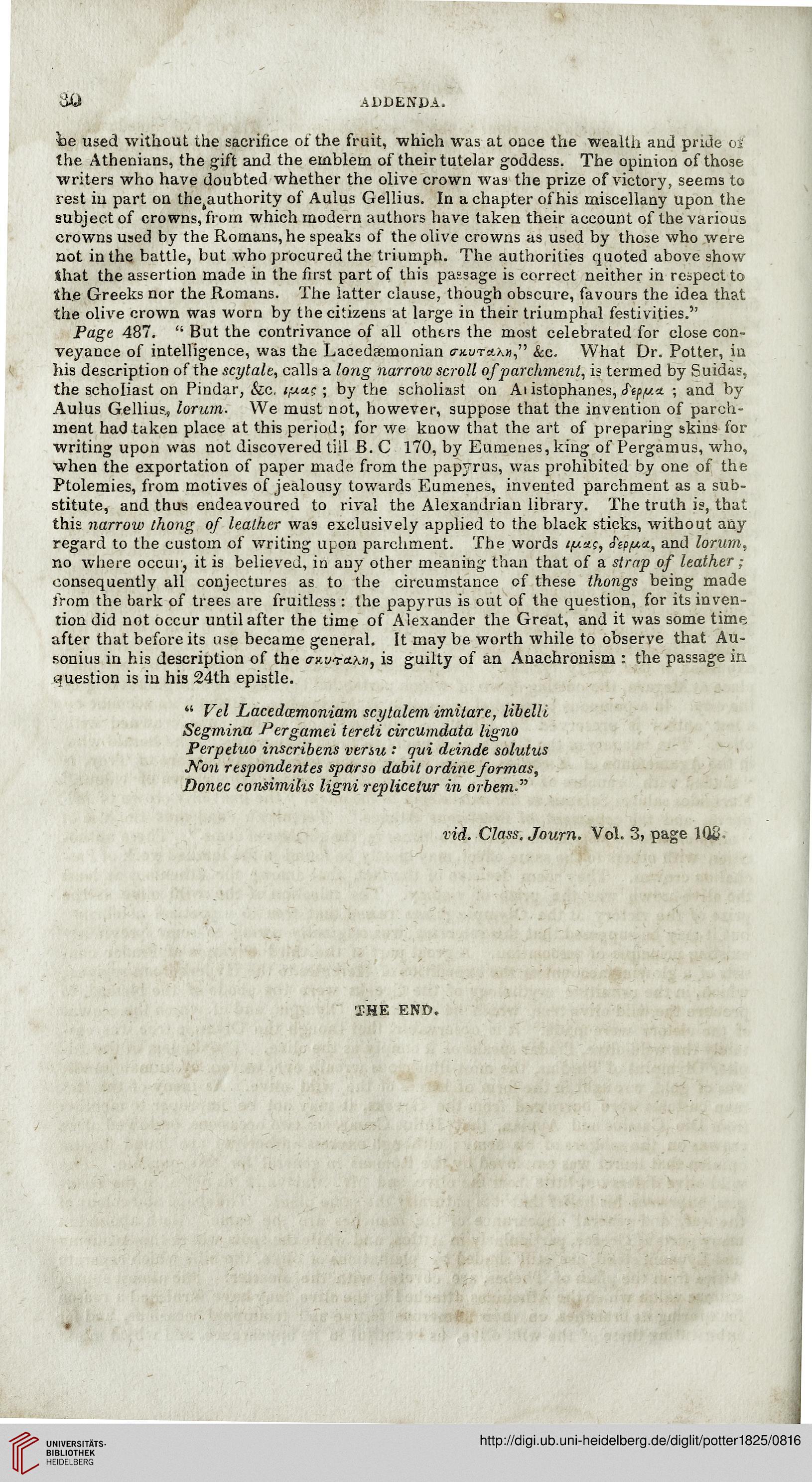ADDENDA.
■be used without, the sacrifice of the fruit, which was at once the wealth and pride of
the Athenians, the gift and the emblem of their tutelar goddess. The opinion of those
writers who have doubted whether the olive crown was the prize of victory, seems to
rest in part on the4authority of Aulus Gellius. In a chapter of his miscellany upon the
subject of crowns, from which modern authors have taken their account of the various
crowns used by the Romans, he speaks of the olive crowns as used by those who were
not in the battle, but who procured the triumph. The authorities quoted above show
that the assertion made in the first part of this passage is correct neither in respect to
the Greeks nor the Romans. The latter clause, though obscure, favours the idea that
the olive crown was worn by the citizens at large in their triumphal festivities.''
Page 487. " But the contrivance of all others the most celebrated for close con-
veyance of intelligence, was the Lacedaemonian o-x.urx.kyi" &c. What Dr. Potter, in
his description of the scytale, calls a long narrow scroll of parchment, is termed by Suidas,
the scholiast on Pindar, &c. ijuug; by the scholiast on Ai istophanes, S~ip/u<t ; and by
Aulus Gellius., lorum. We must not, however, suppose that the invention of parch-
ment had taken place at this period; for we know that the art of preparing skins for
writing upon was not discovered till B. C 170, by Eumenes, king of Pergamus, who,
when the exportation of paper made from the papyrus, was prohibited by one of the
Ptolemies, from motives of jealousy towards Eumenes, invented parchment as a sub-
stitute, and thus endeavoured to rival the Alexandrian library. The truth is, that
this narrow thong of leather was exclusively applied to the black sticks, without any
regard to the custom of writing upon parchment. The words /<«ac, ftp/**, and lorum,
no where occur, it is believed, in any other meaning than that of a strap of leather;
consequently all conjectures as to the circumstance of these thongs being made
from the bark of trees are fruitless : the papyrus is out of the question, for its inven-
tion did not occur until after the time of Alexander the Great, and it was some time
after that before its use became general. It may be worth while to observe that Au-
sonius in his description of the o-y.vra.?^, is guilty of an Anachronism : the passage in
question is in his 24th epistle.
" Vel Lacedcetnoniam scytalem imilare, libelli
Segmina fergamei tereti circumdata ligno
Perpetuo inscribens versu •" qvi dtinde solutus
Noil respondentes sparso dabit ordine formas,
Donee consimihs ligni replicelur in orbem"
rid. Class. Journ. Vol. 3, page 102.
IHE END.
■be used without, the sacrifice of the fruit, which was at once the wealth and pride of
the Athenians, the gift and the emblem of their tutelar goddess. The opinion of those
writers who have doubted whether the olive crown was the prize of victory, seems to
rest in part on the4authority of Aulus Gellius. In a chapter of his miscellany upon the
subject of crowns, from which modern authors have taken their account of the various
crowns used by the Romans, he speaks of the olive crowns as used by those who were
not in the battle, but who procured the triumph. The authorities quoted above show
that the assertion made in the first part of this passage is correct neither in respect to
the Greeks nor the Romans. The latter clause, though obscure, favours the idea that
the olive crown was worn by the citizens at large in their triumphal festivities.''
Page 487. " But the contrivance of all others the most celebrated for close con-
veyance of intelligence, was the Lacedaemonian o-x.urx.kyi" &c. What Dr. Potter, in
his description of the scytale, calls a long narrow scroll of parchment, is termed by Suidas,
the scholiast on Pindar, &c. ijuug; by the scholiast on Ai istophanes, S~ip/u<t ; and by
Aulus Gellius., lorum. We must not, however, suppose that the invention of parch-
ment had taken place at this period; for we know that the art of preparing skins for
writing upon was not discovered till B. C 170, by Eumenes, king of Pergamus, who,
when the exportation of paper made from the papyrus, was prohibited by one of the
Ptolemies, from motives of jealousy towards Eumenes, invented parchment as a sub-
stitute, and thus endeavoured to rival the Alexandrian library. The truth is, that
this narrow thong of leather was exclusively applied to the black sticks, without any
regard to the custom of writing upon parchment. The words /<«ac, ftp/**, and lorum,
no where occur, it is believed, in any other meaning than that of a strap of leather;
consequently all conjectures as to the circumstance of these thongs being made
from the bark of trees are fruitless : the papyrus is out of the question, for its inven-
tion did not occur until after the time of Alexander the Great, and it was some time
after that before its use became general. It may be worth while to observe that Au-
sonius in his description of the o-y.vra.?^, is guilty of an Anachronism : the passage in
question is in his 24th epistle.
" Vel Lacedcetnoniam scytalem imilare, libelli
Segmina fergamei tereti circumdata ligno
Perpetuo inscribens versu •" qvi dtinde solutus
Noil respondentes sparso dabit ordine formas,
Donee consimihs ligni replicelur in orbem"
rid. Class. Journ. Vol. 3, page 102.
IHE END.




